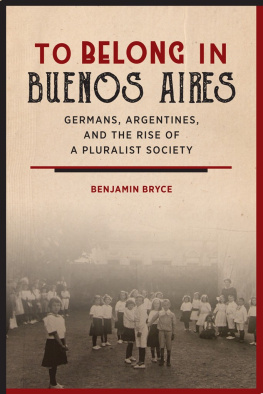Stanford University Press
Stanford, California
2018 by the Board of Trustees of the Leland Stanford Junior University.
All rights reserved.
Stanford University Press acknowledges financial support from the University of Northern British Columbia for this publication.
No part of this book may be reproduced or transmitted in any form or by any means, electronic or mechanical, including photocopying and recording, or in any information storage or retrieval system without the prior written permission of Stanford University Press.
Printed in the United States of America on acid-free, archival-quality paper
Library of Congress Cataloging-in-Publication Data
Names: Bryce, Benjamin, author.
Title: To belong in Buenos Aires : Germans, Argentines, and the rise of a pluralist society / Benjamin Bryce.
Description: Stanford, California : Stanford University Press, 2018. | Includes bibliographical references and index.
Identifiers: LCCN 2017018403 (print) | LCCN 2017020486 (ebook) | ISBN 9781503601536 (cloth : alk. paper) | ISBN 9781503604353 (ebook)
Subjects: LCSH: GermansArgentinaBuenos AiresEthnic identityHistory. | EthnicityArgentinaBuenos AiresHistory. | NationalismArgentinaBuenos AiresHistory. | Cultural pluralismArgentinaBuenos AiresHistory. | Buenos Aires (Argentina)Emigration and immigrationHistory.
Classification: LCC F3001.9.G3 (ebook) | LCC F3001.9.G3 B79 2018 (print) | DDC 305.800982/11dc23
LC record available at https://lccn.loc.gov/2017018403
Typeset by Bruce Lundquist in 10/12 Sabon
Folge mir, lieber Leser nach Sdennach dem sagenumwobenen Strande des Silberstromes, denn dort, wo die blauen Fluten des Atlantischen Ozeans die grne Ebene der Pampa ksst, liegt Argentinien, dessen Hauptstadt Buenos Aires ist, meine neue Heimat und das Vaterland meiner Kinder.
Follow me, dear reader, to the southto the fabled shores of the River Plate, for there, where the green plains of the pampas kiss the blue tides of the Atlantic Ocean, lies Argentina, with its capital Buenos Aires, my new homeland and the fatherland of my children.
Leo Mirau, Lieder aus weiter Ferne, 1905.
Acknowledgments
Many people have assisted me with this project, and I have a great deal to thank them for. Jeffrey Lesser read the entire manuscript and my dissertation before that, and he has provided all sorts of intellectual guidance since our shared exploration of Berlin in 2011. Anna Casas Aguilar, David Brandon Dennis, Jacqueline Holler, and Andrew Watson generously read the entire manuscript and pushed me to rethink several themes at crucial stages of the revision process. The external reviewers, Donna Guy, Glenn Penny, and Jeane DeLaney, provided excellent advice about how to broaden the focus of this book and hone its contribution. For all of your insight and feedback on drafts of this manuscript, many thanks! This book grew out of a dissertation that compared German-language education and religion in Argentina and Canada. My co-supervisors Gillian McGillivray and Roberto Perin, committee member Marcel Martel, and external examiner Jos Moya helped me think through many concepts in this book. I am grateful to all of you.
Brittany Luby and Andrew Watson have read almost every word I have ever published, and I am extremely grateful for all of their questions and challenges. What a great idea our SIG writing group was! David Sheinin has given friendly support for my writing, research questions, and ongoing interest in Argentina. David Atkinson, Alejandra Bronfman, Dan Bullard, Jerry Dvila, Pamela Fuentes, Rachel Gordan, Russell Kazal, Alex Lichtenstein, Martn Marimn, Robert Nelson, Grace Pea Delgado, Ian Radforth, Bradley Skopyk, and Chris Stolarski commented on different chapters, and I deeply appreciate their advice, disagreements, and requests for clarity. Participants in the New Ethnic Studies Workshop at Tel Aviv University and two Southern Cone History Workshops at Glendon College provided helpful feedback as well. I also owe many thanks to Paul Axelrod, Colin Coates, Alexander Freund, Christopher Friedrichs, William Jenkins, Robert Kelz, Dana Wessell Lightfoot, Ian Milligan, Anne Rubenstein, and Jonathan Swainger. During my research, Alicia Bernasconi, Mara Bjerg, Ren Krger, and Regula Rohland were of great assistance in Buenos Aires, as was Stefan Rinke in Berlin.
My colleagues Ted Binnema and Jacqueline Holler provided excellent advice on navigating the editorial process, and their guidance helped me avoid many bumps in the road. Ted showed me the ins and outs of indexing, which saved me weeks of frustration. Ted also created one of the maps used in this book, and he made the other two maps look presentable. I am most grateful for his generosity. Alex Leamy helped me with Geographic Information Systems data, and Reshaad Durgahee, Nick Hersh, and Nick Melling had great opinions and sharp eyes for historical and geopolitical accuracy.
At Stanford, my editors Margo Irvin and Kate Wahl provided excellent guidance throughout the editorial process, and their enthusiasm for this project has motivated me to meet deadlines and make revisions. Stephanie Adams, Marie Deer, Anne Fuzellier, Ariane de Pree-Kajfez, and Nora Spiegel have shepherded this book through production, and I know that they did so much work on the manuscript behind the scenes that I am not sure whom to thank for what. Parts of previously appeared in the Journal of Social History, and I thank the editors and Oxford University Press for allowing me to use that material here.
My family has given me important intellectual and emotional support, and I am sure they all see or would have seen their influence on this study of language, religion, and children. Anna Casas Aguilar has shaped this project and shaped me since we first met in Berlin in October 2005. Her love, creativity, and enthusiasm have guided me ever since. Our son Gabriel was born after I completed most of the revisions, but Anna worked very hard to ensure that I had enough time (and an office!) so that this book moved smoothly through production. Muchas gracias!
I would like to thank several institutions in Buenos Aires that granted me access to their private archives. The directors of the Bonifatius-Gemeinde, the Colegio Guadalupe, the Colegio Espritu Santo, the Colegio Mallinckrodt, the Congregacin Evanglica Alemana en Buenos Aires, the Deutsche Wohlttigkeitsgesellschaft, the Editorial Guadalupe, the Escuela Cangallo, the Escuela Goethe, the Hospital Alemn, and the Iglesia Evanglica del Ro de la Plata kindly opened their archives to me. The librarians at the Biblioteca Nacional, the Biblioteca Nacional de Maestros, and the Instituto Universitario ISEDET were generous with their time and deserve much praise. The staff at the University of Northern British Columbia Library, the University of Toronto Libraries, and York University Libraries provided great help as well, and librarians at the University of British Columbia, Whitman College, and Wright State University helped me with small but important things at just the right moments.
In Germany, the archivists at the Politisches Archiv des Auswrtigen Amts stand out for their friendly help and extensive collection. The staff of the Bibliothek fr bildungsgeschichtliche Forschung, the Bundesarchiv, the Diakonie library, the Evangelisches Zentralarchiv, the Ibero-Amerikanisches Institut, and the Staatsbibliothek were all extremely helpful, and it was a great pleasure to carry out research at all of these Berlin institutions. I am also thankful for the impressive collections and pleasant assistance of the staff at the Deutsche Nationalbibliothek in Leipzig, the Institut fr Auslandsbeziehungen in Stuttgart, and the Deutscher Caritasverband Bibliothek in Freiburg. Enno Haaks in Leipzig generously granted me access to the private archive of the Gustav-Adolf-Werk. Archivists and librarians at the British National Archives and the British Library in London, the Archives diplomatiques in Paris, the Biblioteca de Catalunya in Barcelona, and the Archivo Histrico Nacional in Madrid offered friendly assistance to a young professor whose research might have seemed off topic.












